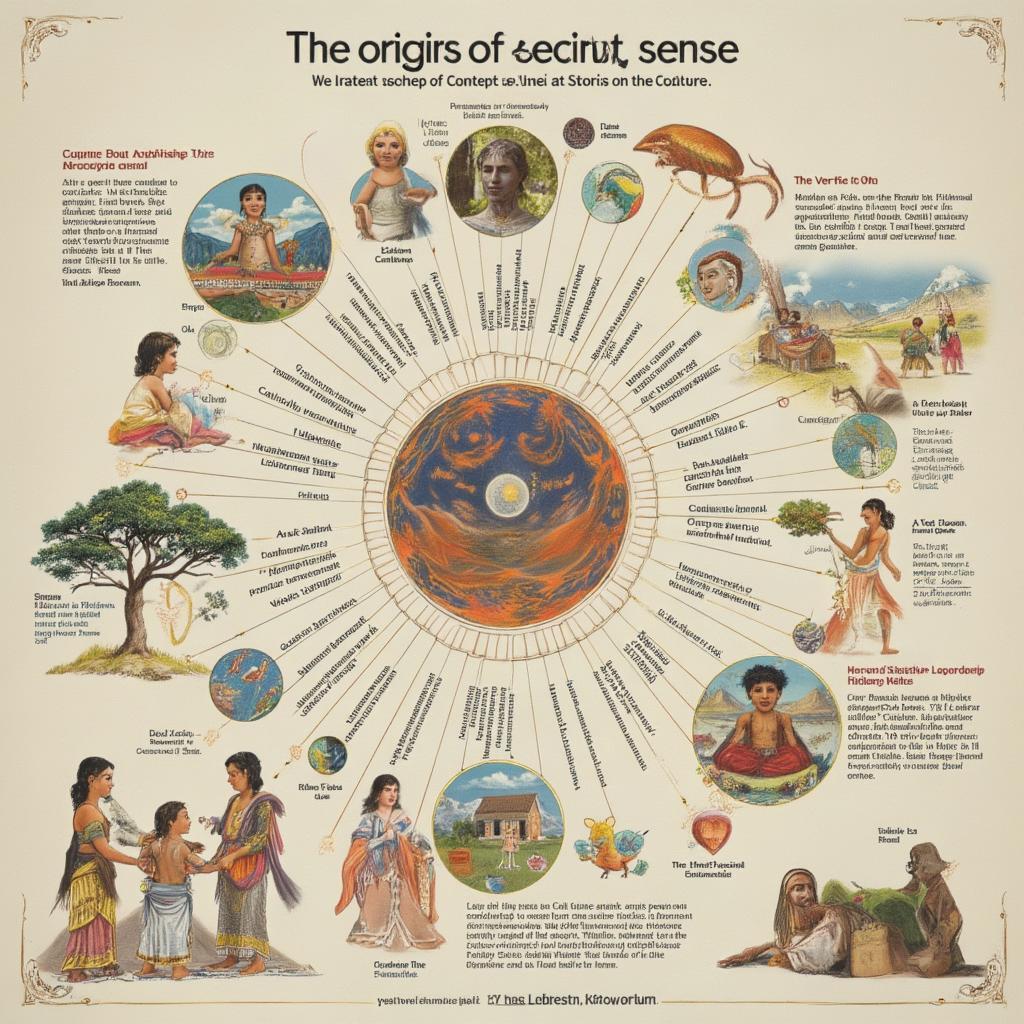Unlocking the Enigmatic Sixth Sense: Beyond the Five Senses

Have you ever felt like you knew something was about to happen, or had an uncanny feeling about a place or a person? This often leads us to ponder about the existence of a Sixth Sense, a concept that has fascinated humans for centuries. This article will explore what the sixth sense is, where it stems from, how it manifests, and whether it’s actually something we all possess.
What Exactly Is the Sixth Sense?
The term sixth sense typically refers to a form of extrasensory perception (ESP), which is the ability to perceive information through means other than the traditionally recognized five senses: sight, hearing, smell, taste, and touch. It encompasses a wide range of abilities including:
- Clairvoyance: The ability to gain information about events or objects through means other than the known senses. Think of it as “seeing” things that are not physically present.
- Clairaudience: Hearing sounds that are not normally audible or coming from unknown sources.
- Clairsentience: Feeling or experiencing the emotions, thoughts, or physical sensations of others or in specific places. This can manifest as a gut feeling or intuition.
- Precognition: The ability to foresee future events.
- Telepathy: The direct transfer of thoughts or feelings from one person to another without using spoken or written language.
While the scientific community often views these abilities as pseudoscience, they are frequently found in folklore, mythology, and even some spiritual practices. The idea of the sixth sense resonates deeply with many who believe in a reality that extends beyond the observable physical world.
Where Does the Concept of a Sixth Sense Originate?
The belief in a sixth sense can be traced back to ancient cultures and philosophical traditions. Throughout history, there have been claims of individuals with psychic abilities, from oracles and seers in ancient Greece to spiritual mediums in more recent times.
- Ancient Philosophies: Philosophers like Plato explored the notion of intuition and innate knowledge. Many early beliefs saw the soul as having a deeper understanding than the physical body.
- Spiritual and Religious Traditions: Various religions around the world have incorporated the idea of the sixth sense into their beliefs. Practices like meditation, prayer, and divination are often used to tap into inner wisdom and unseen realms.
- Parapsychology: This field of study attempts to investigate psychic phenomena using scientific methods, albeit with limited success. Despite the challenges, it continues to explore the possibility of ESP.
While mainstream science may remain skeptical about the existence of a sixth sense, its enduring presence in various cultures shows its significance and continued fascination to many.

How Does the Sixth Sense Manifest?
The ways a sixth sense might manifest are numerous and vary greatly from person to person. Some experience it as a sudden flash of insight, while others feel it more gradually. Here are some common ways that people describe experiencing their intuition or “sixth sense”:
- Gut Feelings: An immediate, instinctive reaction to a situation without knowing why. It’s that feeling that tells you to avoid a certain path or trust a certain person.
- Deja Vu: The uncanny sensation of having previously experienced the present moment. While often explained through neurological factors, some believe deja vu could be linked to precognition.
- Intuitive Knowing: A sense of knowing something to be true without any logical reason or rational explanation.
- Emotional Empathy: Feeling the emotions of others strongly, sometimes to the point of being overwhelmed. Some believe this is an advanced form of empathy that goes beyond basic human interaction.
- Precognitive Dreams: Having dreams that seemingly foretell future events.
It is crucial to note that these experiences are often subjective and can be difficult to verify. However, for many, these events represent genuine insights that come from a source deeper than their five senses.
The Role of Intuition
Intuition is often described as the voice of the sixth sense. It’s that internal whisper that guides you without any clear or logical reasons. Here are some specific ways intuition may show up:
- Sudden clarity: A moment of sudden insight, as if a light bulb went on in your head.
- A feeling of unease: A sense that something is not right, even though everything seems normal on the surface.
- A strong attraction or aversion: An instant feeling of like or dislike for someone or a situation, even though you’ve just met or seen it.
“The human mind is more complex than we imagine, and what we consider as intuition or a gut feeling might be an integration of information that occurs at a subconscious level,” according to Dr. Evelyn Reed, a renowned cognitive psychologist.
Can You Develop Your Sixth Sense?
While some people may naturally have a stronger intuition or a predisposition toward psychic abilities, many believe it’s a skill that can be cultivated and enhanced through conscious effort.
If you are curious to see if your sixth sense can be improved, here are some potential steps to consider:
- Practice Mindfulness: Engaging in regular meditation and mindfulness exercises can help quiet the mind and sharpen awareness, allowing intuitive signals to become clearer.
- Trust Your Gut: Pay attention to those inner feelings that don’t seem to come from any logical explanation. By trusting your gut, you can strengthen your ability to recognize its guidance.
- Journaling: Writing down your thoughts and feelings can help you notice patterns and triggers in your intuitive experiences.
- Connect with Nature: Spending time in nature can help you connect with a deeper sense of yourself and the world around you, which may enhance your sensitivity to subtle energies.
- Engage in Creative Activities: Expressing yourself through art, music, or other forms of creativity can open you to different channels of perception.
- Be Open to Possibilities: Challenge your preconceived notions and embrace the potential for the extraordinary.
developing-sixth-sense-with-mindfulness
Scientific Skepticism Versus Personal Belief
There is a clear divide between personal experience and scientific scrutiny when we are talking about the sixth sense. Mainstream scientists often dismiss claims of extrasensory perception as being unfounded or stemming from psychological biases. Here’s a quick breakdown:
- Scientific View: Critics point to the lack of verifiable, repeatable evidence for ESP and suggest that apparent intuitive experiences are often due to coincidence, misinterpretation, or cognitive biases.
- Personal View: Many people feel that these phenomena are a reality, despite what science says. They believe it’s a deeper awareness beyond current science’s capacity to fully explain.
” The fact that we can’t yet measure or explain a phenomenon doesn’t mean that it does not exist. As we keep on exploring, what we considered magic in the past is now science. We may simply be too limited by our current methodology to understand the sixth sense,” noted Dr. Alistair Finch, a researcher in cognitive neuroscience.
The Sixth Sense in Popular Culture
The concept of the sixth sense has frequently been depicted in literature, film, and television, often in ways that amplify its enigmatic and sometimes supernatural nature. This helps solidify the term in our collective consciousness.
- Psychic Detectives: Movies and shows with detectives that have a unique ability to solve cases through their psychic abilities.
- Foresight and Prophecy: Stories of characters who can predict the future, creating high drama and suspense.
- Spirit Mediums: Narratives focusing on those who can communicate with spirits and otherworldly beings.
These portrayals often blur the line between reality and fiction, contributing to the continued fascination with the potential of a sixth sense. They fuel the idea that there is more to reality than meets the eye and that we are all capable of accessing more than our five senses.

The Future of Sixth Sense Research
Whether you view the sixth sense as a real phenomenon or a fascinating illusion, the concept offers a compelling exploration of what it means to be human. While it’s difficult to prove scientifically, the experiences described by those who believe in it offer a captivating glimpse into the deeper possibilities of our minds. Ongoing research into consciousness and human perception might one day shed light on the mysteries of intuition and the possibility of abilities beyond the traditional senses. The key is to keep an open mind and remain inquisitive.
Practical Takeaway Points
- The sixth sense is related to psychic abilities and intuition.
- These abilities, while not always scientifically proven, remain an important aspect of human experience.
- Anyone can potentially improve their intuition through intentional practices.
- The concept remains a source of endless wonder.
Conclusion
In conclusion, the sixth sense, whether a real phenomenon or a captivating myth, presents a compelling area of exploration. It invites us to consider the depths of our consciousness and the possibility of abilities beyond the five senses. While mainstream science might be skeptical, many people experience profound moments of intuition and insight, indicating that there might be more to reality than meets the eye. By remaining curious and open to the unknown, perhaps we can discover new dimensions of human perception.
FAQ About The Sixth Sense
- What is the difference between intuition and the sixth sense?
While often used interchangeably, intuition is considered to be the mental process by which we access our sixth sense. It is the language and the mechanism through which we interpret the information being given by the sixth sense. - Is the sixth sense scientifically proven?
No, there is currently no concrete scientific proof of the sixth sense. It largely remains in the realm of anecdotal evidence and parapsychological study. However, this does not negate the experience many people report having. - Can everyone develop their sixth sense?
While some may be more naturally inclined, it’s widely believed that everyone can develop their intuition and perceptive abilities through conscious effort and practices like mindfulness. It might be easier for some than others, but the potential is there for everyone to some extent. - Does having a gut feeling mean I have a sixth sense?
Gut feelings are often considered a manifestation of intuition, which is strongly linked to the sixth sense. A strong feeling may be your mind’s way of processing information below the surface of conscious awareness. - Are there any cultures that emphasize the sixth sense more than others?
Yes, many ancient and indigenous cultures have traditions that focus on intuition and ESP, often incorporating them into spiritual and shamanic practices. It is not just a modern idea, it has been a part of humanity since the beginning. - Can the sixth sense be harmful?
No, in its normal form, intuition and an active sixth sense cannot be harmful, However, becoming overwhelmed by information through empathy or precognition may bring some stress to the person using their sixth sense. - Is the sixth sense the same as a psychic ability?
The sixth sense is often associated with psychic abilities, such as clairvoyance and telepathy, but intuition is also a part of it. Being psychic might represent a higher level of sensitivity and control over this sense. - Why is it hard to study the sixth sense scientifically?
It is difficult to study this phenomenon due to its subjective nature and the lack of a measurable mechanism. It does not act like our other senses, making it difficult to find a way to measure or replicate. - Can the sixth sense help us in everyday life?
Yes, many people find that trusting their intuition can lead to better decision-making, improved emotional awareness, and a deeper connection to their own feelings and the world around them.

 developing-sixth-sense-with-mindfulness
developing-sixth-sense-with-mindfulness


